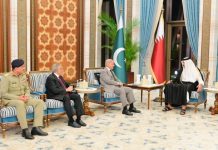-The Watchdog urges Indian authorities to release detained Journalists
-Asks New Delhi to allow Journalists to do their jobs without fear of reprisal
-Warns India correct ‘shameful’ record of harassing and detaining critical journalists
DM Monitoring
WASHINGTON: The Committee to Protect Journalists (CPJ), an independent watchdog body, Sunday called on authorities in Indian Illegally Occupied Jammu and Kashmir (IIOJ&K) to immediately release arrested Journalists, cease detaining and questioning Journalists, and commit to allowing the media to operate freely.
“India needs to move quickly to improve its shameful record of harassing and detaining critical journalists in Jammu and Kashmir in a complete abandonment of India’s once-proud tradition of press freedom,” said Steven Butler, CPJ’s Asia programme coordinator, in Washington, D.C.
“Police must immediately release Salman Shah and Suhail Dar and allow journalists to do their jobs without fear of reprisal,” he added. Since October 8, CPJ, citing news reports, said four journalists were detained, subsequently releasing two of them, and questioned one other.
The five journalists namely Salman Shah, editor of Kashmir First, the online weekly magazine of the privately owned news website The Kashmiriyat; Suhail Dar, a freelance journalist contributing to the privately own news websites The Kashmiriyat and Maktoob Media, and the privately owned Urdu-language newspaper Sach News; Mukhtar Zahoor, a freelance journalist contributing to the BBC; Majid Hyderi, a freelance journalist and commentator contributing to the privately owned news channels Times Now, Republic TV, CNN News 18, India Today, and India News Sajad Gul, a freelance journalist contributing to privately owned news websites The Kashmir Walla and Mountain Ink.
CPJ, said the authorities formally arrested Dar and Shah on Thursday, and both remain detained at Anantnag district jail. Also on Thursday, a local magistrate ordered Shah and Dar to remain detained for two days, according to The Kashmir Walla.
On the evening of October 8, authorities summoned Dar to the Sadder police station in Kashmir’s Anantnag district for questioning before detaining him, according to news reports and Dar’s brother, Tariq Dar, who spoke to CPJ via phone. Tariq Dar told CPJ that the police had not informed the family of any reasons for his brother’s detention.
Separately, at approximately 7:00 p.m. on October 12, officers with the Sherbagh police station in Anantnag district detained Shah from his home in the Sheerpora area of Anantnag district for questioning, according to The Kashmir Walla and his brother Imran Shah, who spoke to CPJ via phone.
Imran Shah said that his family had not been informed of any police investigation into Shah until his formal arrest yesterday.
Both journalists have been accused of violating two sections of the Indian penal code, pertaining to “knowingly joining or continuing in assembly of five or more persons after it has been commanded to disperse” and abetment, according to The Kashmir Walla, citing unnamed sources, and another person familiar with the cases, who spoke to CPJ on the condition of anonymity, citing fear of reprisal by authorities.
“Knowingly joining or continuing in assembly of five or more persons after it has been commanded to disperse” can carry a prison sentence up to six months and an unspecified fine, according to the law, which specifies that abetment of an offense can carry the same punishment as the offense itself.
Tariq Dar and Imran Shah told CPJ that they have not received a copy of a police report detailing the accusations against Dar and Shah.
Masarat Mir, the station house officer of the Sadder police station, did not respond to CPJ’s request for comment on Dar’s ongoing detention sent via messaging app. Majid Nadeem, the station house officer of the Sherbagh police station, also did not respond to CPJ’s request for comment on Shah’s ongoing detention sent via messaging app.
Separately, on October 13, the Special Operations Group, the anti-insurgency unit of the Jammu and Kashmir police, summoned Majid Hyderi for questioning at its headquarters in Srinagar, according to The Kashmir Walla and Hyderi, who spoke to CPJ via phone.
Upon arriving at the headquarters, Hydrei was asked to relinquish his phone, but refused to do so, and subsequently switched off his phone upon request, according to the journalist. Hyderi told CPJ that three men in civilian clothing questioned him about his source of income and choice of profession before demanding explanation for three of his Facebook posts. Officers specifically questioned Hyderi for approximately one hour about a post in which he criticized the police’s use of force against participants of Muharram processions earlier this year, he said.
After the questioning finished at around 1:00 p.m., Hyderi was kept in lockup until his release around 5:30 p.m., he said, adding that he was not allowed to offer two Muslim prayers during the questioning and during his detention.
Iftikhar Talib, the superintendent of the Special Operations Group, did not respond to CPJ’s request for comment on Hyderi’s questioning and detention sent via messaging app.
Separately, October 13, officers with the Hajin police station in Kashmir’s northern Bandipora district summoned Gul for questioning in relation to his news report in Mountain Ink and a video he posted on Twitter regarding a Kashmiri man who was killed in a police encounter on October 11, according to The Kashmir Walla and the journalist, who spoke to CPJ via phone. Gul told CPJ that he was questioned for approximately one hour about his journalistic activities. Zahid Malik, senior superintendent of police of Bandipora district, did not respond to CPJ’s request for comment on Gul’s questioning sent via WhatsApp.




